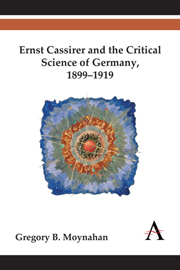Book contents
- Frontmatter
- Dedication
- Contents
- Acknowledgments
- List of Abbreviations
- Introduction “Reading a Mute History”: Ernst Cassirer, the Marburg School and the Crises of Modern Germany
- Part I The Marburg School and the Politics of Science in Germany
- Chapter One The Twentieth-Century Conflict of the Faculties: The Marburg School and the Reform of the Sciences
- Chapter Two Cassirer and the Marburg School in the Administrative and Political Context of the Kaiserreich
- Chapter Three “The Supreme Principles of Knowledge”: Cassirer's Transformation of the Tenets of Cohen's Infinitesimal Method (1882) and System of Philosophy (1902–1912)
- Part II Critical Science and Modernity
- Part III Liberal Democracy and Law
- Conclusion Critical Science, the Future of Humanity and the Riddle of An Essay on Man (1944)
- Index
Chapter Three - “The Supreme Principles of Knowledge”: Cassirer's Transformation of the Tenets of Cohen's Infinitesimal Method (1882) and System of Philosophy (1902–1912)
from Part I - The Marburg School and the Politics of Science in Germany
Published online by Cambridge University Press: 05 September 2013
- Frontmatter
- Dedication
- Contents
- Acknowledgments
- List of Abbreviations
- Introduction “Reading a Mute History”: Ernst Cassirer, the Marburg School and the Crises of Modern Germany
- Part I The Marburg School and the Politics of Science in Germany
- Chapter One The Twentieth-Century Conflict of the Faculties: The Marburg School and the Reform of the Sciences
- Chapter Two Cassirer and the Marburg School in the Administrative and Political Context of the Kaiserreich
- Chapter Three “The Supreme Principles of Knowledge”: Cassirer's Transformation of the Tenets of Cohen's Infinitesimal Method (1882) and System of Philosophy (1902–1912)
- Part II Critical Science and Modernity
- Part III Liberal Democracy and Law
- Conclusion Critical Science, the Future of Humanity and the Riddle of An Essay on Man (1944)
- Index
Summary
Few texts summarize and at the same time compound the challenges of their author's general philosophy as much as Cohen's The Principle of the Infinitesimal Method and its History of 1881. Cohen begins his text by writing that it is crucial to understand calculus “because it is the basic idea of the mathematical sciences,” and there is no doubt that he wanted to convince his readers of its pivotal philosophical importance in this regard. The work however almost immediately suggested a far broader philosophical agenda. Both in its initial form and its later adumbrations, the basic themes in Cohen's reception of the infinitesimal theory led to his split with key premises of Kantian philosophy and to the foundations of his own late philosophy. As Cassirer states in his “Neo-Kantianism” article for the Encyclopedia Britannica in 1912, Cohen's early readings of Kant were the “high point of Neo-Kantian thought” – with the implication that his late work moves in a new definition that might not fit under this rubric. Cohen's late philosophy, he continues, develops directly from the Infinitesimal Method and the infinitesimal anchors Cohen's central claim that “reality is never ‘given’ in any sense, in neither sensation nor in mere intuition.” Reality is both “constructed” and “revealed” through forms of judgment following the unfolding of thought, and understanding the middle voice in which this occurs is the central challenge of Cohen's philosophy.
- Type
- Chapter
- Information
- Publisher: Anthem PressPrint publication year: 2013



